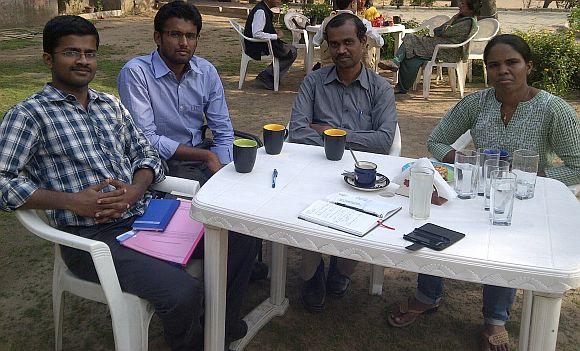
The members of the Save Tamils Movement are camping in New Delhi, trying to knock on the corridors of power to impress upon the government to stop playing second fiddle on the Sri Lankan Tamils issue, Sheela Bhatt reports.
"Do you know thousands of students from over 200 Tamil educational institutions are protesting against Sri Lanka's ill-treatment of ethnic Tamils since the last many weeks?"
"Do you know that thousands of students are on a token fast today (Thursday) across Tamil Nadu to demand independent international investigation into Sri Lanka's war crimes. They don't want to support a "diluted" resolution of the United Nations Human Rights Council against Sri Lanka."
"We are dismayed by New Delhi's lack of respect for sentiments of Indian Tamils..."
Sa Elangovan of the Save Tamils Movement is determined to run the campaign against "Sinhala chauvinism and genocide against Sri Lankan Tamils".
The Save Tamils Movement is a small group of young IT professionals, who despite not knowing Hindi have come to New Delhi with translated Tamil essays. One of them is titled "Is India digging its own grave?"
Click on NEXT to read further...

Their much-debated argument is that saving Tamils in northern Sri Lanka is in India's strategic interest.
There is a wave in Tamil Nadu against the Sri Lankan Army's atrocities against innocent Tamils during the last phase of war against the Liberation Tigers of Tamil Eelam in 2009, claim Tamil activists.
They say that the Tamil Nadu assembly has passed a resolution in 2011 imposing an economic embargo against Sri Lanka but nobody outside the state knows or talks about it.
Elangovan works for one of the IT giants, but does not want to drag his reputed company into the discourse. He and his two IT graduate friends -- Parimala and Pravin Raj -- have come to New Delhi without much money, but a lot of fire in their belly.
They are accompanied by a lawyer T Amarnath.
Amarnath tells rediff.com that people across Tamil Nadu are now realizing the real impact of what actually happened in 2009 when LTTE chief Velupillai Prabhakaran was killed and the outfit was defeated by the Sri Lankan Army.
Click on NEXT to read further...
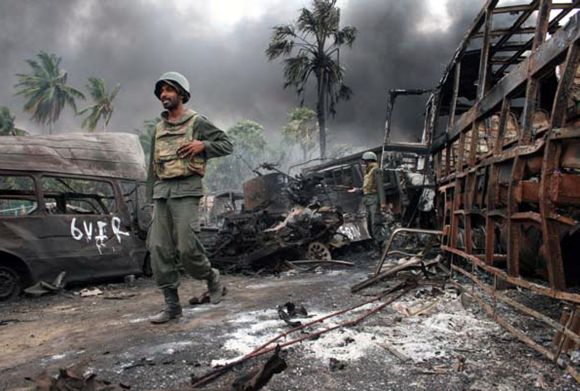
The young Tamilians believe that it is now better understood how the politics of Sri Lankan President Mahinda Rajapaksa is successful in "wiping out" Tamils, and not just the LTTE, from northern Sri Lanka.
"Repercussions of the defeat of LTTE are being felt now. The long-time historical impact is percolating deep down in the Tamil world," says Elangovan.
These young IT professionals are putting up with a Tamil Member of Parliament in New Delhi and want to spread the word in the media and amongst politicians that the 2009 "blood bath" of Eelam Tamils has not been reported properly and that the Sri Lankan government must be taken to task for their war crimes.
The UN body must institute an independent investigation into Sri Lanka's war crimes, they demand.
They are charged up, equipped with gruesome photographs of raped-murdered Tamil women and mutilated bodies of children. They want to ensure that Indian government should not help Sri Lanka secretly "dilute" the UN draft which, they allege, is already reaching that fate.
Click on NEXT to read further...
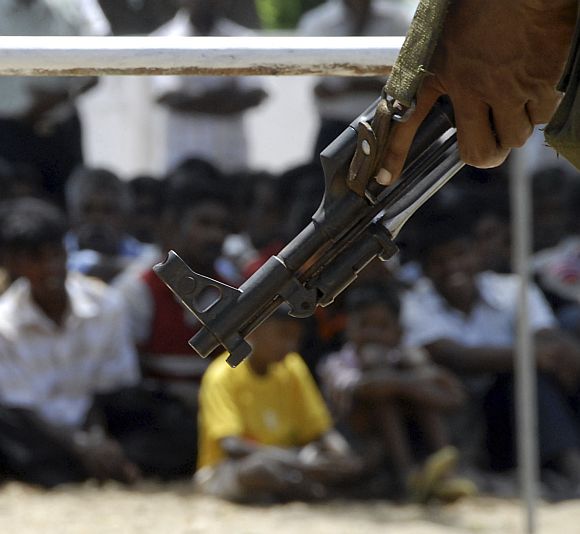
By no means are these activists influential, powerful or resourceful. But they are eager to see that in the post-UN resolution period the Sri Lankan government is not given enough time to occupy the areas in northern part of the country that were once occupied by Tamils for centuries.
"We think the issue is about time. The Sri Lankan government should not be given time to finish their job to wipe out Tamils from their territory. Before they do so the international investigation must be done and truth must come out," says Parimala.
Elangovan adds, "India should understand that it has the major responsibility in the issue. It is a question touching more than 70 million Indian Tamils."
The young Tamilians have all the arguments and counter-arguments ready with them.
Parimala said, "New Delhi should not use the (late Prime Minister) Rajiv Gandhi card all the time. His assassination cannot be an excuse to allow killings of 1.4 lakh Sri Lankan Tamils by the Rajapaksa government."
Elaborating the argument, Parimala said: "Rajiv Gandhi's assassination cannot be the sole reason for Indian government to justify its political support to the Sri Lankan government. If you do, we can justify it with the killing of innocent Tamils carried out by the Indian Peace Keeping Force. But we would not do so. We condemn Rajiv Gandhi's killing because we are Indians."
Click on NEXT to read further...
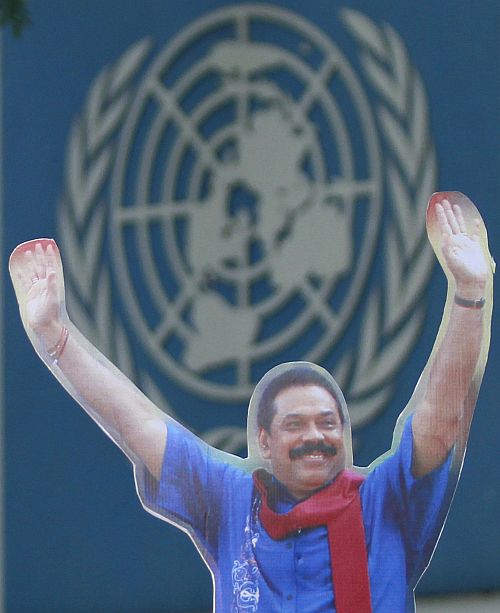
According to the revised version of the UN resolution against Sri Lanka, the US is asking for an international investigation into alleged human rights violations in the 2009 war.
It is now believed that in the last stage of the war the Sri Lankan government used tremendous force to crush the LTTE. The quite authentic looking videos and photographs painstakingly collected largely by Western activists have fuelled the claim.
And since India was supportive of the Sri Lankan government in the final stages of the war against the LTTE it has created an embarrassment for New Delhi.
"The blood of innocent Sri Lankan Tamils can taint the Congress-led government at the Centre also," say the activists.
In the last four years, the activists say, the Sri Lankan government has not shown any sign of devolution of power in favour of Ealam Tamils. The Sinhalese politics too has not softened its stand over Tamils.
More and more Hindu temples are being demolished and replaced by Buddhist temple complexes in the northern parts, where Tamils settled thousands of years ago.
Click on NEXT to read further...
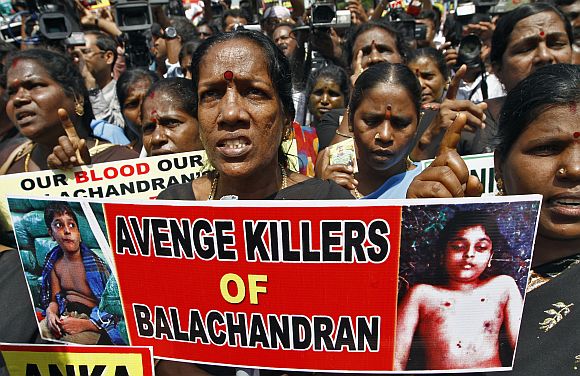
Parimala says, "The issue is about land. The Sri Lankan government is ensuring that there remains no corner left for Tamils in their country."
India is doing some deft diplomacy behind the scene by ensuring that the repercussions on bilateral relations are taken care of in case India votes for the resolution against Sri Lankan.
Many independent experts have noted that India and Sri Lanka's bilateral relations are much bigger than the issue of Sri Lankan Tamils. However, the pressure from the Dravidian parties of Tamil Nadu is such that it will be impossible to ignore it, particularly, when the elections are coming closer.
The Rajapaksa government has been slow in taking political, constitutional, social and cultural steps after the war to assuage feelings of Tamilians.
Obviously, Sri Lankan government has rejected the UNHC resolution which they found to be "substantive, intrusive and political in nature."
Click on NEXT to read further...
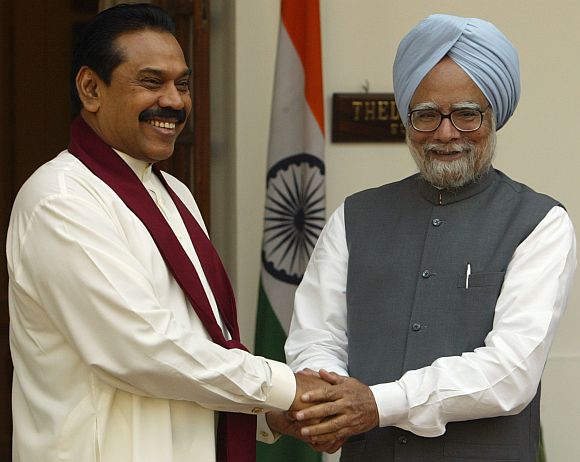
Some experts who are not ready to "limit bilateral relations to the Sri Lankan Tamil issue" think that India's best option is to vote for the resolution after helping Sri Lanka, clandestinely, get something in form of a weaker resolution or some time space.
The Indian government is weighing the political repercussions inside Tamil Nadu and also juxtaposing the national interest to see that the Sri Lankan government follows certain basic terms and conditions to sustain the balance in the relationship.
The Indian side so far thinks that 'Sri Lanka has respected red lines; the Rajapaksa government has not given permanent presence to the Chinese'.
China's growing influence is always a serious factor in dealing with neighbours.
The bottom-line of India's national interest in Sri Lanka, as viewed by UPA government, is: "The issue of Sri Lankan Tamils is not the only interest of India in Sri Lanka. But, it is a matter of huge interest for Indian Tamils and government has to recognize it."
"India does not understand Tamil sentiments," the Tamil IT professionals summed up.